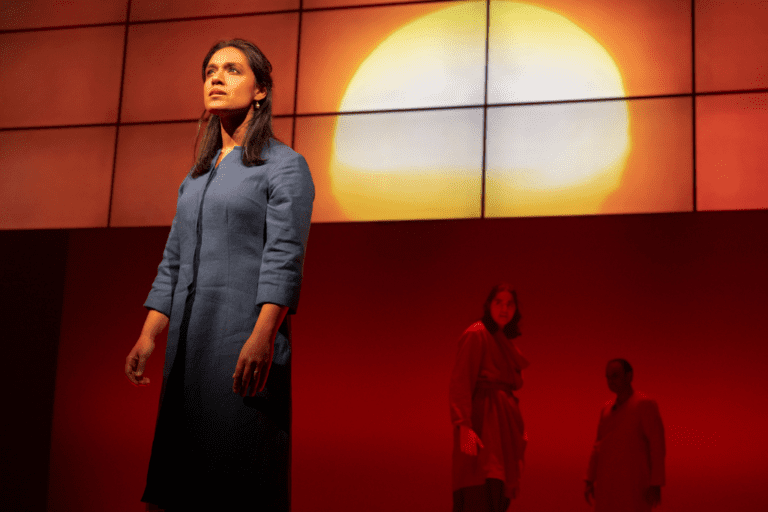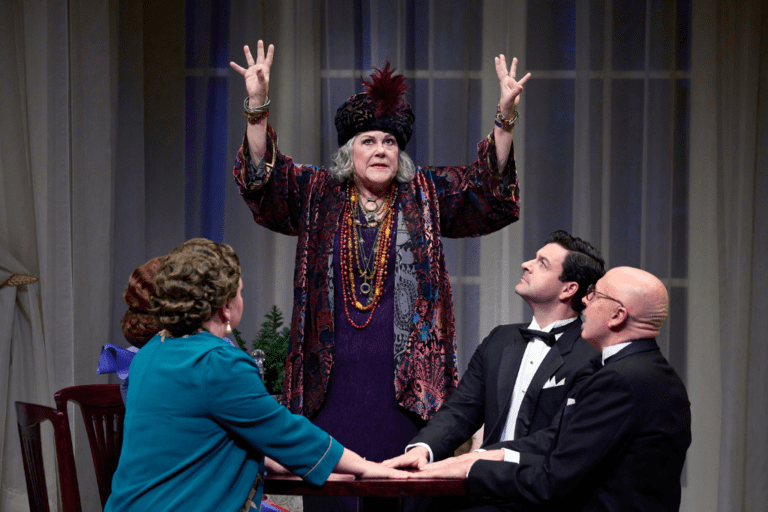Rehearsals and Raptors Games: In Dialogue with Pipeline’s Akosua Amo-Adem and Tony Ofori
There’s a game tonight.
Pipeline assistant director Luke Reece bounds into a Soulpepper conference room in full Raptors-red garb, joined by the equally decked-out Tony Ofori. Akosua Amo-Adem, playing Nya in Soulpepper’s production of Dominique Morisseau’s searing drama about the school-to-prison pipeline, follows them, grinning.
The three Toronto-based artists are at the beginning of what promises to be a demanding tech week, but there are no complaints of exhaustion, no stifled yawns, no crankiness to be found. From my vantage point over Zoom (I’m pretty sure they’ve projected me onto a wall inside the office space), everyone’s thrilled to be here. There’s nowhere they’d rather be.
Well — maybe the Raptors game.
Reece sprints out of frame — he’s got a busy week ahead — and leaves me to chat with Amo-Adem and Ofori, who’s playing Omari, Nya’s son. We’re here to talk about Pipeline: Morriseau’s play, and Weyni Megesha’s directorial treatment of it. It’s a highly anticipated production (a “timeless” one, says Ofori), another in a string of works which were programmed and then postponed in 2020, and the cast could not be more thrilled to finally, finally get to share it with audiences.
“This play was supposed to open in 2020,” says Amo-Adem. “Then the pandemic happened, then George Floyd happened. Even before 2020, conversations about systemic racism were happening, and this was going to be a vehicle to talk about that. I think post-George Floyd, it’s even more in our consciousness.”
Amo-Adem’s right: Pipeline indeed promises to speak to a collective consciousness scarred by the murder of George Floyd — to a community in the midst of ongoing dialogue on racial reckoning and reconciliation. The play follows a single mother, Nya, both as an educator herself and as an advocate for her son, through the inner machinations of an inner-city school system. Pipeline draws attention to the school-to-prison pipeline, a system which preys upon racialized, and particularly Black, students.
And that system is just as present in Canada as it is in the United States, where the play was written and set by Morriseau.
“The likelihood of a Black body being suspended in school is much higher than for its white counterpart,” says Amo-Adem. “It’s an atrocious number. I think it’s something a lot of Canadians…it’s not even in their consciousness. They don’t think that’s something that’s happening in our city.”
The likelihood of a Black body being suspended in school is much higher than for its white counterpart.
Ofori, born and raised in Toronto, agrees, sharing a stinging, relevant personal anecdote.
“I was suspended for the first and only time on the second-to-last day of school,” he says. It’s a story he’s told a lot recently — it came up early in rehearsals for Pipeline.
“My friend was horsing around with me, and a teacher saw it and told the principal that I was being aggressive towards him, which was not at all the case. Even the student himself said that was not the case. And still, on the second-to-last day of school, for the first time ever, I got suspended. In my last year of high school.”
“I was valedictorian of my school, just to put that in perspective.”
The silence hangs in the air.
What’s beautiful about the play is that no one’s a hero. Everybody falters at some point.
Pipeline is a timely piece of theatre being brought to life by an all-star cast and creative team. Nya in particular is an emotionally demanding role — building her character has been a complicated and gratifying experience for Amo-Adem.
“What’s beautiful about this play,” she says, “is that no one’s a hero. Everybody falters at some point. We’re all a part of this system, we’ve all bought in. We’ve all soaked up the good and the bad. As much as negative stereotypes exist in the world about Black bodies — Black bodies have also been absorbed into those negative stereotypes about Black bodies. It’s that complex and circular.”
Megesha and Reece have made bringing the role to life an incredibly rewarding artistic process.
“Weyni and Luke are just good at what they do — I mean, it’s Weyni, and it’s Luke,” says Amo-Adem.
“What I love about Weyni’s process is we do table work, we talk about the play, the people, the moments. She’s meticulous, and she asks us to be honest — that’s my brand of artistry. Tell the truth. As long as we’re telling the truth, it doesn’t matter what we do and how we do it: it’s the truth. There’s a lot of freedom to play and explore the character because the only thing she asks of us is honesty.”
“Luke’s grabbing me my giant water bottle and keeping me hydrated during those tough emotional moments,” she says, laughing.
We share a dialogue. We share blood, and we share culture, and we share an origin.
Ofori has found support not only from the creative team, but from his cast — a cast which, Ofori and Amo-Adem agree, has become incredibly close.
“I totally forget this is the first time we’ve worked together,” he says with a smile, speaking of his onstage mum, Amo-Adem.
“Akosua and I are both from the same place in the world, Ghana, and we’re both in theatre. We share a dialogue. We share blood, and we share culture, and we share an origin. So stepping into this space with Akosua was safe, and I felt like I could drown in whatever the story asked of me. I knew I’d have support.”
And it’s not just Amo-Adem and Ofori who have found community in each other — that camaraderie is present across the Pipeline team, from the cast to the designers to the stage managers to the directors.
“I feel like I’ve known everybody in this cast for my whole life!,” says Amo-Adem. “It’s quite a special group of people. We bond over everything — music, food, current events. Just yesterday we went out for a McDonald’s run. We piled into cars and went to the furthest McDonald’s from here, and we ordered our stuff to go and ate together in the green room. And it was all of us, including our director and our assistant director, our stage management team, and everybody in the cast.”
“Tony and Luke, too… they’re going to see the Raptors game tonight. All of us were invited, but some of us make less money than others, so…” There’s a huge laugh — from Amo-Adem, from Omari, from me.
“We bond over the Raptors. It’s real… it feels like family,” she says.
We’re like a family.
“It’s a joy to wake up and come to this building and know I’m going to see these phenomenal people. And that’s including the crew. Everybody… it’s just a wonderful group of people. It’s been a real gift to work on this play with these people as one of the first shows back after nearly two years of not doing theatre.”
Pipeline runs at Soulpepper until May 8. Tickets are available here.















Comments